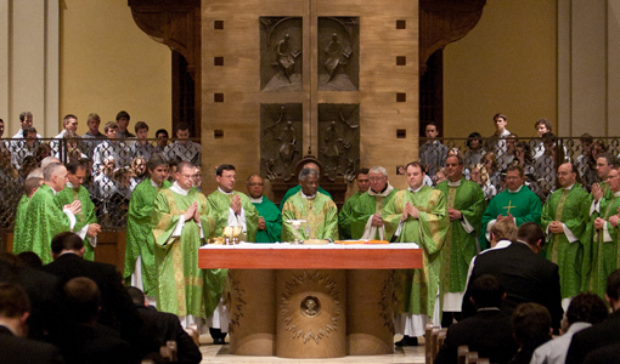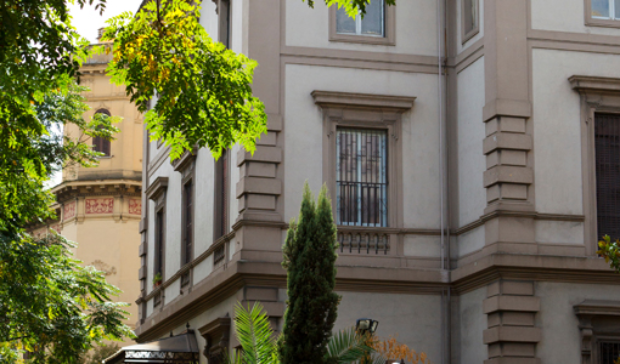The collaboration between the Pontifical Council for Justice and Peace and the John A. Ryan Institute for Catholic Social Thought has been ambitious and fruitful. In addition having the past three presidents of the council speak at the University of St. Thomas, the Ryan Institute has co-sponsored with the council international conferences, seminars and research projects over the past 12 years.
In 1999, Cardinal Nguyen Van Thuan, then-president of the Pontifical Council, spoke on the Pontifical Council’s raison d’etre: to promote peace and justice in the world according to the Gospel and the social doctrine of the Church. In 2006 Van Thuan’s successor, Cardinal Renato Martino arrived on campus to enlighten students, faculty and staff about the Catholic Church’s social, economic and spiritual perspectives on the role of work. This past fall, in keeping with tradition, Cardinal Peter K.A. Turkson (Ghana), arrived on campus to give a lecture. Turkson’s lecture, “Caritas in veritate: Good News for Society,” was based on Pope Benedict’s 2009 encyclical, Caritas in veritiate, which elucidated the requirement to place justice and moral rectitude within the truth of charity, and the need for a humanism whose fundamental model is Christ.
Caritas in veritate begins with a fundamental formulation: “The truth needs to be understood, found and expressed within the ‘economy’ of charity, but charity in turn needs to be understood, confirmed and practiced in the light of truth. In this way, not only do we do a service to charity enlightened by the truth, but we also help give credibility to truth, demonstrating its persuasive and authenticating power in the practical setting of social living.” This formulation, the necessity and admittance of charity practiced in truth, is often dismissed in current societies due to the rise of relativistic religious attitudes, yet is necessary for the common good. “In the present social and cultural context, where there is a widespread tendency to relativize truth, practicing charity in truth helps people to understand that adhering to the values of Christianity is not merely useful but essential for building a good society and for true integral human development.”
Catholic social thought is housed within this ideal model of truth as the basis of charity. “This dynamic of charity received and given is what gives rise to the Church’s social teaching, which is caritas in veritate in re sociali: the proclamation of the truth of Christ’s love in society. This doctrine is a service to charity, but its locus is truth.” Benedict continues, “Caritas in veritate is the principle around which the Church’s social doctrine turns, a principle that takes on practical form in the criteria that govern moral action.” Two criteria that received special attention were justice and the common good.
Both justice and the common good have their loci in a Christ-centered humanism, as global human flourishing is at the center of both principles. “Love in truth – caritas in veritate – is a great challenge for the Church in a world that is becoming progressively and pervasively globalized. The risk for our time is that the de facto interdependence of people and nations is not matched by ethical interaction of consciences and minds that would give rise to truly human development. Only in charity, illumined by the light of reason and faith, is it possible to pursue development goals that possess a more humane and humanizing value,” Turkson said.
Turkson warned the faithful that man needs God as the foundation for understanding who he is and, therefore, how to act morally and ethically. “A humanism which excludes God is an inhuman humanism. Only a humanism open to the Absolute can guide us in the promotion and building of social and civil life – structures, institutions, culture and ethos – without exposing us to the risk of becoming ensnared by the fashions of the moment.” Turkson reiterated Benedict’s position of a Christ-centered humanism and added that this is where hope, the good news for society, is to be found.
In addition to his public lecture on Caritas and veritate, Turkson presided over October’s Catholic Studies Community Night, which included Mass at the St. John Vianney Seminary Chapel, followed by discussion on the need for Catholic students to engage culture. He then joined the students for an Italian dinner in Murray-Herrick Campus Center.
Cardinal Turkson’s complete lecture can be viewed online at: www.stthomas.edu/cathstudies/programs/habiger/default.html
Read more from Perspectives







